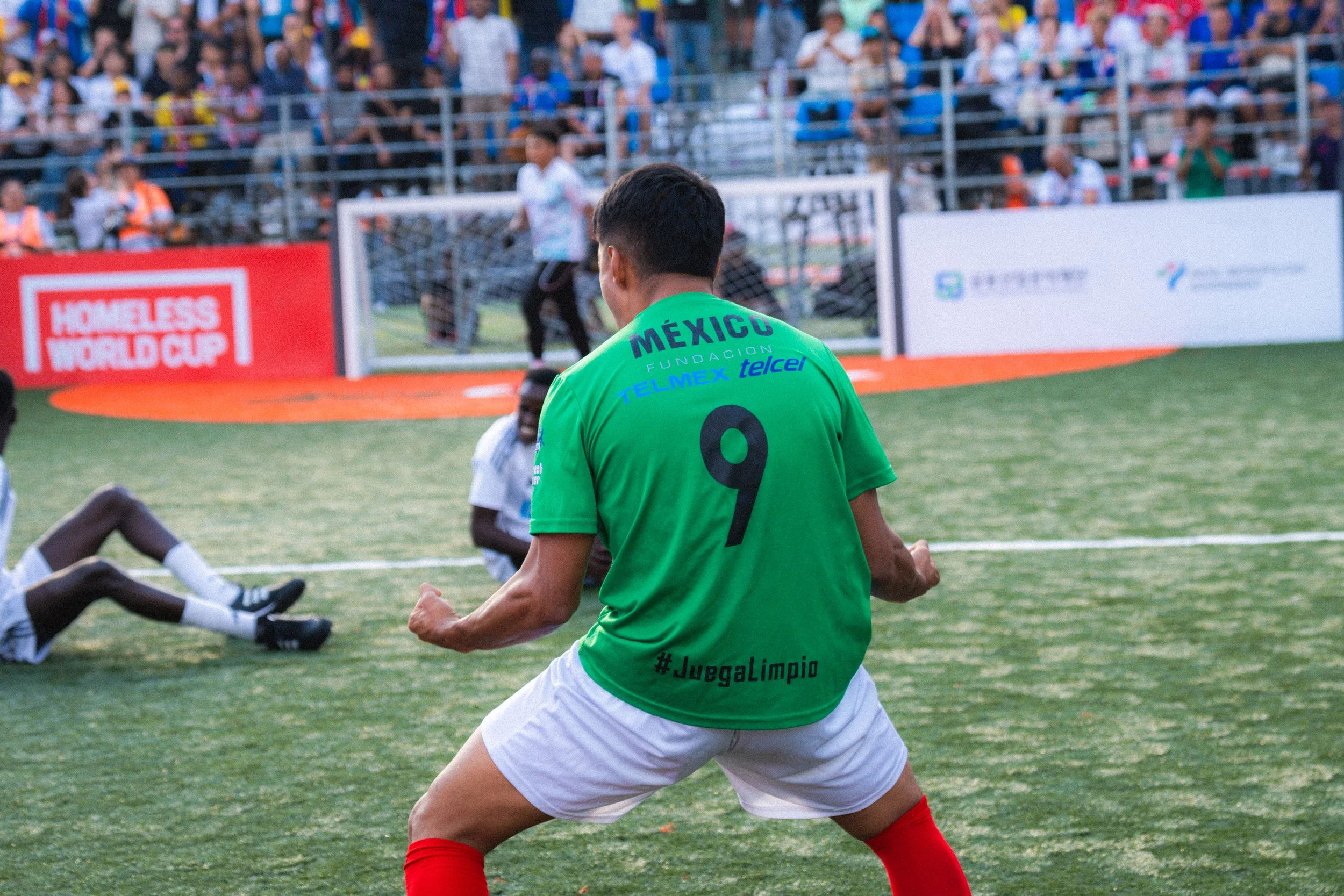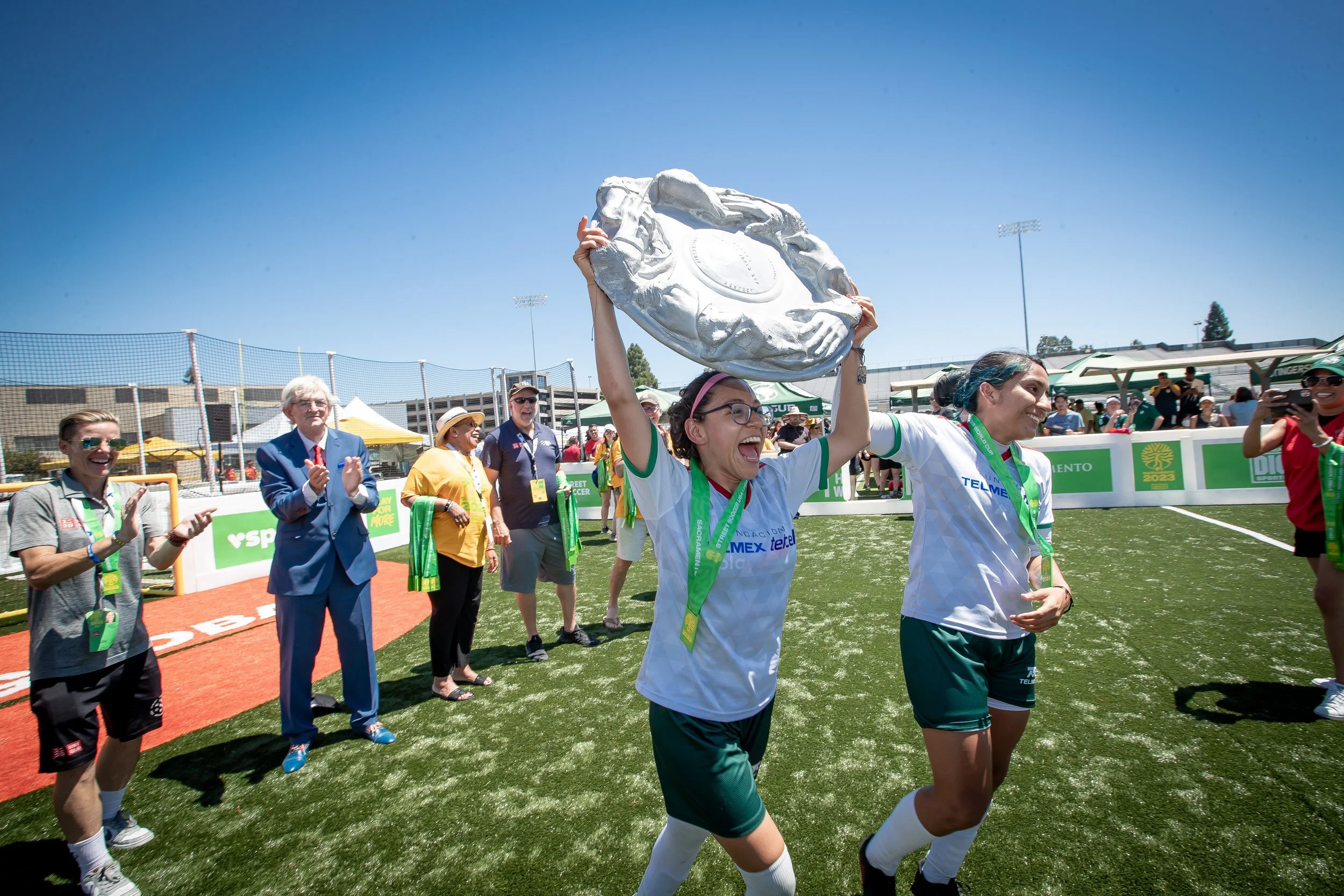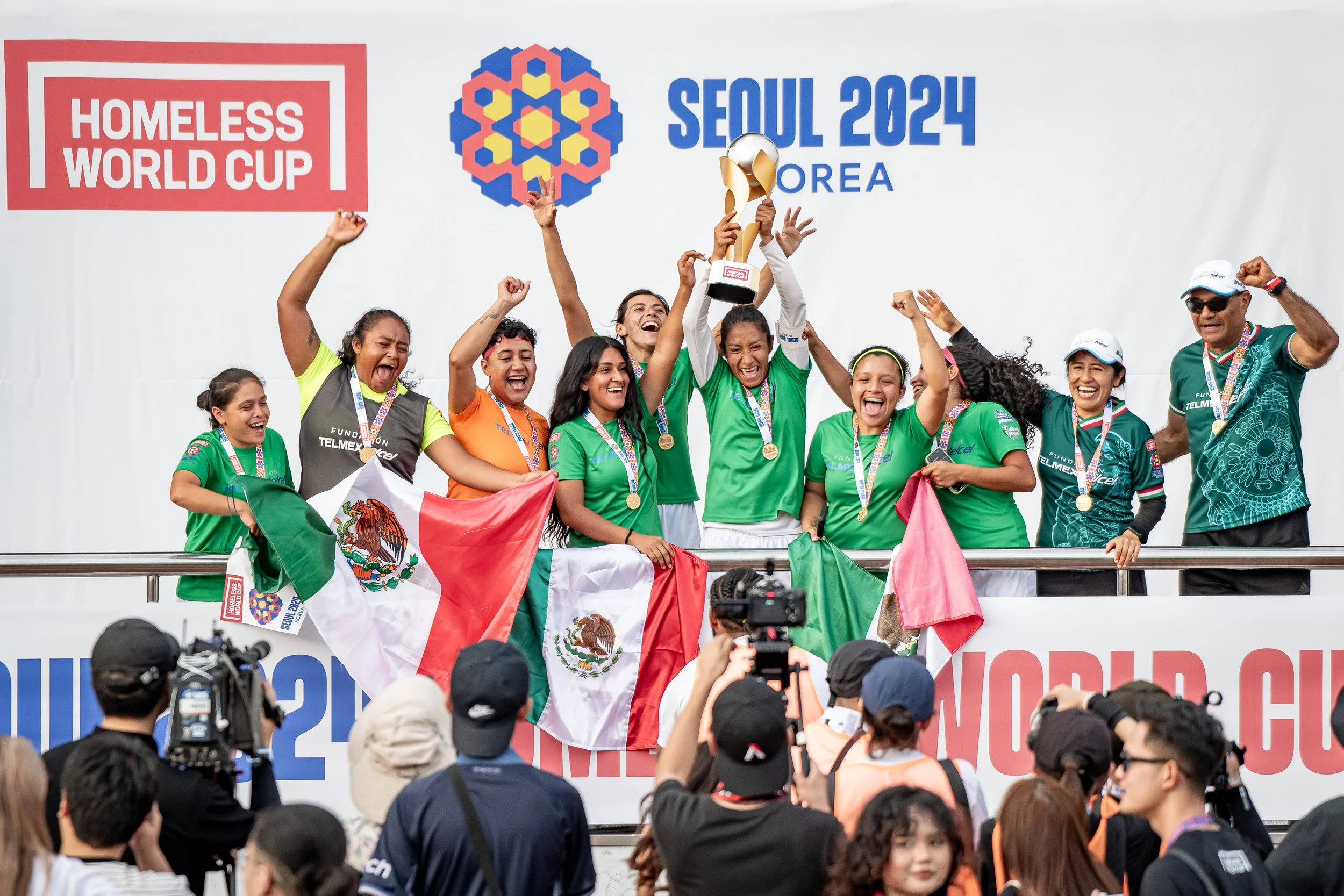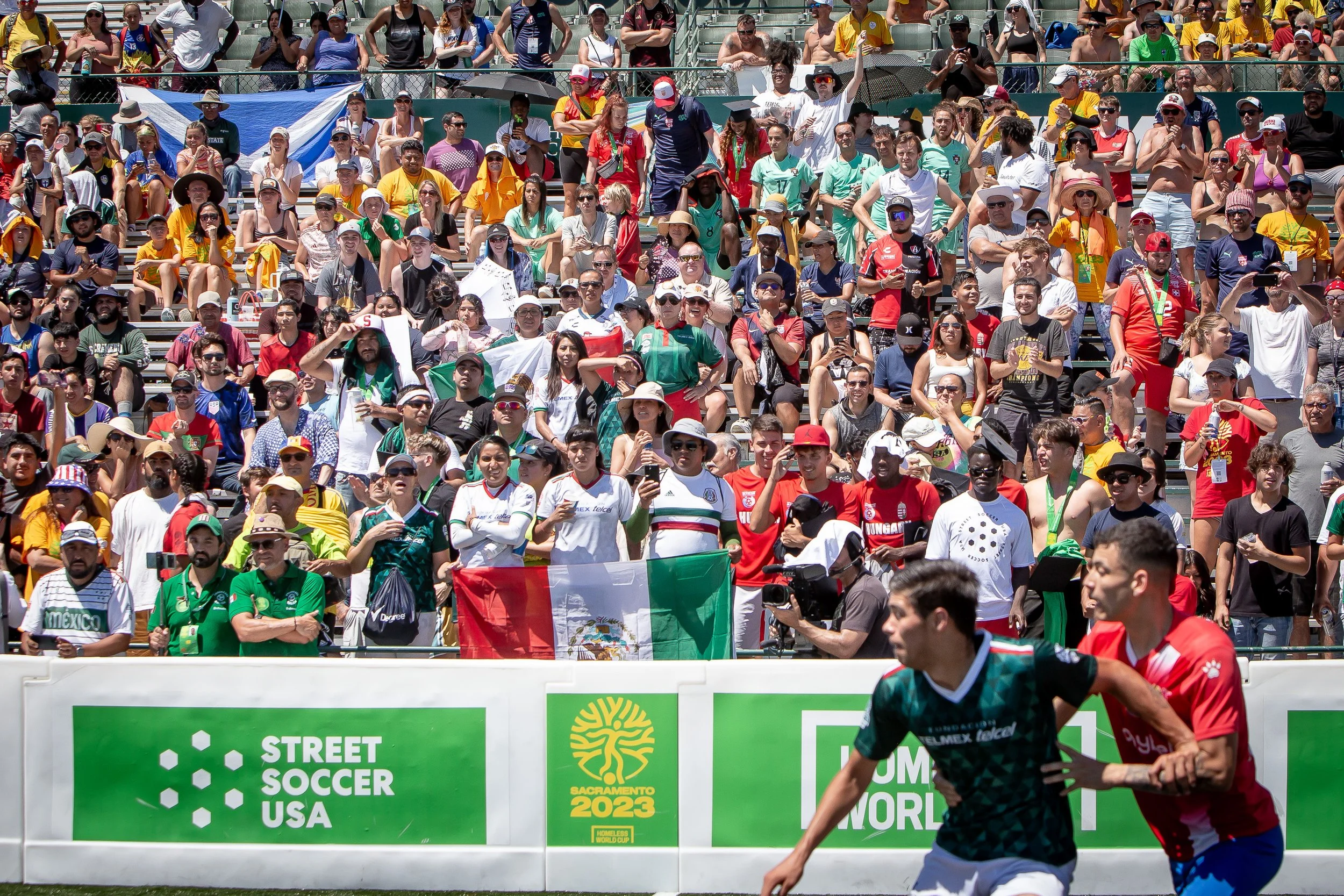The green, white and red of team mexico
Mexico won the double at last year’s Seoul 2024 Homeless World Cup
Words by Isobel Irvine
The green, white and red of the Mexican team is a familiar sight on the pitches at Homeless World Cup. However Street Soccer Mexico didn’t have its beginnings in Central America but further north, in Canada.
Working at the Centre for Addictions and Mental Health in Toronto in the early 2000s Daniel Copto (now CEO and President of Street Soccer Mexico) started a football league in the city for the benefit of some of the people he was treating. “I saw the way playing football helped them and decided to take a team of players to the Homeless World Cup in Edinburgh in 2005,” he explains.
“Before, they were struggling with the ideas of drug usage but after they were called to that national squad, they start thinking of getting well, getting stronger, practising and all thoughts of using went out of their head.”
This was a turning point for Daniel. The whole idea of being part of a team was achieving more than he had been accomplishing with those he had been treating in his office.
“It was amazing - priceless,” he recalls. “Then I spoke to Mel Young. Mexico wasn’t participating [in Homeless World Cup] back then so I asked him to allow me to start a team in Mexico and moved back home.”
Up to this point Daniel had been living comfortably in Canada, with a good job and lifestyle, and returning to Mexico meant starting over. Along with three others, they began to grow the organisation, working to use football as a tool for change, keeping participants away from drugs, the streets and unhealthy lifestyles, while restoring their dignity and self-respect.
In 2006, Mexico took part in the tournament in Cape Town, South Africa. The following year, ahead of Copenhagen 2007, the first state selection tournament in the community of Tuxtilla was run as a pilot programme. In 2008, Street Soccer Mexico was legally established as a non-profit civil association. With limited financial resources, four Mexican states were able to participate in the state tournaments ahead of the tournament that year in Melbourne, Australia.
Then, in 2009, Street Soccer México and Fundación Telmex [a philanthropic organisation connected to the country’s telecommunications companies] joined forces to organise social soccer tournaments in eight states, leading to the formation of a national team to represent the country that year in Milan.
In 2010, given the social impact achieved, the project expanded to include the whole Mexican Republic with nearly 6,500 people from 32 states participating that year.
“We remain, however, a very small organisation, still just four staff,” Daniel explains. “We do now have a budget from Fundación Telmex which allows us to coordinate the whole programme across the whole country.
“We make partnerships all over Mexico where we join with organisations working with youth at very different levels. We have some recovery programmes, work with some institutions, basically reaching out to the neighbourhoods in each state - they know exactly where the violence and drugs are - to reach the population we want to target.
“We invite them to participate in our tournaments, explain about state and national tournaments and, since they like football, it’s easy for them to get motivated to participate.”
The organisation’s intention is that by participating in these events, the experience will help young people develop a different perspective from the one they've been socially taught.
“Twenty years ago it was a little challenging to engage people,” says Daniel, “but now we have empowered so many people in the community, those who participated in the programme before, to go back to their communities, relate the life stories of those players in the national squad to inspire others to follow in their footsteps.”
Every year Street Soccer Mexico engages with 28,000 people across the country and has partnerships with organisations in all 32 states where they engage with groups who are working with youth at risk, so building a bridge to get them to the services they need.
To begin with, the organisation worked only with homeless but found issues with their approach, as Daniel explains. “The guys from the street don’t align with the homeless support authorities so they’d rather be on the street than go into a place where everyone is telling them what to do and how to live.
“That makes it very hard for us to engage them in a long-term process - we don’t have the resources to engage with them directly, so we have to encourage them to get closer to one of these support organisations. Then we also have to work with those support organisations to help them understand how to approach these people, who are very sensitive.
“Sometimes it doesn’t work that well - we can get the people ready to move forward but then they have a clash with the organisations so they move back to the streets. There’s lots of violence, lots of drugs and for those living on the streets it’s then a long way back.”
Mexico is a country with strong family values and Street Soccer Mexico work hard to find family members that will take people into their homes, to avoid them having to live on the street.
“We get people who might still have a place to live with a family member or a friend that would let them stay in a room - but there may also problems in these places, people using drugs and doing bad things.”
Increasing their circle of work from the homeless, the organisation then began working with kids, doing more preventative work, so now focus on three communities - youth that are at risk, kids in poor neighbourhoods and people on the street. “Ten per cent are those having recently lived on the streets and twenty per cent currently living on the streets. We try to get them off the street as soon as possible so they can get stronger and become fit enough to participate in our programmes.
“Fifty per cent are guys from dangerous neighbourhoods, many using or dealing with drugs or living in violent neighbourhoods, and twenty per cent are kids - we go to primary and secondary schools and work with kids in these neighbourhoods.”
Despite the scale of the challenge, Daniel is keen to underline the many success stories over the years, albeit some tinged with sadness.
“There was one guy we engaged from the streets, back in 2006,” he recalls. “He got so motivated and wanted to be part of the team, so he started to quit using drugs on his own and he got really well, strong and healthy, even though he was still living on the street.
“He was married, he had two kids, and they used to live in a small apartment with his wife’s parents, brother and wife. So he chose to sleep on the street because, if he slept in the family apartment, he would get into trouble as the father and brother-in-law were always drunk.
“Then he made it to the national squad back in 2009, to Milan. After the tournament he got a job as a courier and he was able to move to a small room with his wife and kids, away from the other relatives. He became a good father and was really happy.
“Unfortunately he already had HIV so he died in 2012. But by then he was one of our coaches for the women’s team and had moved on from life on the streets. We still keep in touch with the family - the boy is now 21 and has completed his education. The younger girl is 19 and she’s at university now.”
Looking ahead, he also mentions a current player set to participate in Oslo. Having used drugs for many years - and having seen many of her friends die from drug use, get into trouble and been killed - she became involved with the programme a number of years ago, had been doing well, then relapsed. “But two years ago we had a talk,” Daniel explains, “and made an agreement that if she stayed clean she would be able to go to the national squad team. That was enough motivation for her to stay away from drugs. Now she’s clean, happy and has applied for a job in the police.
“This is what I love about the programme - once the players get well, they get involved in the community and they start to coach; it works very well getting peers along to teach participants to play.
“I also have one former player from Glasgow 2016, who has now been a co-ordinator in Chihuahua for nearly ten years.”
The organisation’s main sponsor is Fundación Telmex Telmex though, occasionally, different local or municipal authorities become involved, with short bursts of limited funding also coming from federal governments. The current federal government is promoting social sport so Daniel hopes Street Soccer Mexico can start to form links with them.
His advice for other countries wanting to adopt a similar model centres around motivation and engagement. “The way you approach the players and get into the community is the most powerful tool. We don’t go there to tell them what to do - like, you must stop using drugs - they have to realise themselves that’s what they have to do. We have to go in very smooth, very humble, to invite them to participate. We tell them stories about other players to trigger their motivation, to inspire them.”
That inspiration and motivation works both ways however, he reckons. “As professionals we believe we are the ones who really know. That’s why we went to school to read, to study. But the truth is that we have a lot to learn from them. We recognise that and allow them to take this role - these people are the experts, they’ve been there for years, are survivors with experiences they can tell us about.
“We have empowered them, to collect all the knowledge and the expertise they have, and then ask them to put that to use to help the many others that are going through what they themselves have experienced.”





